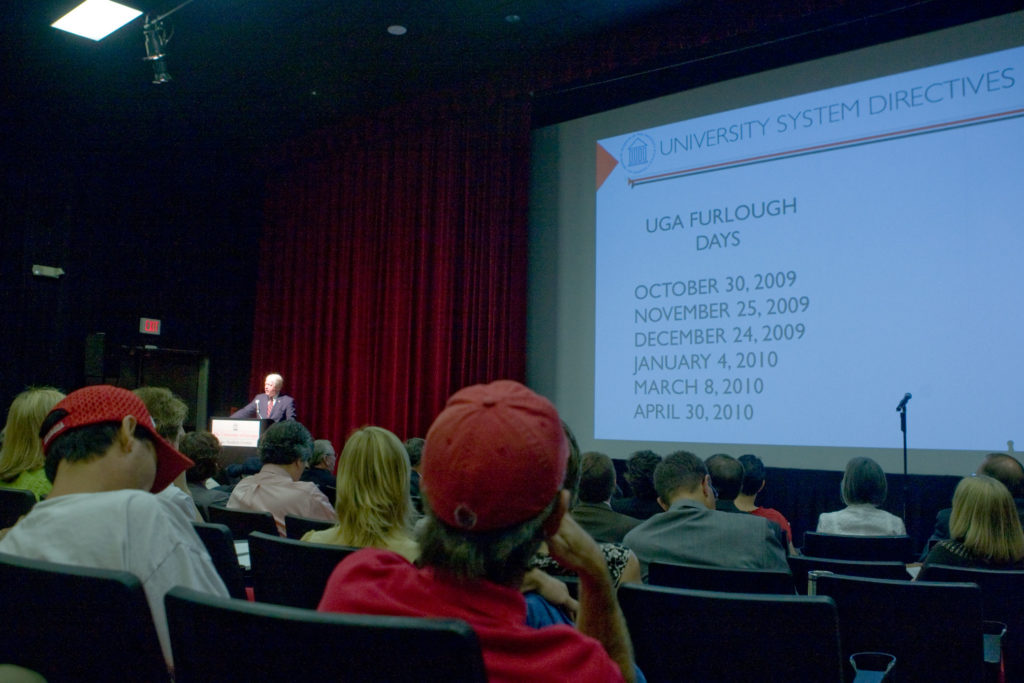Economic hardships are pounding the university, but jobs are safe for now and the level of service will remain strong despite furloughs, UGA President Michael F. Adams told a packed Tate Student Center Theater crowd at a candid budget update presentation Aug. 20.
“I have said it before and I will say it again-this university has continued to function at the level it has through this financial crisis because of the commitment of the people who work here,” he said. “Faculty are teaching more students and more sections; staff have taken on the vacated responsibilities of people with whom they used to work. A lot of creativity and innovation have helped us address these challenges and remain focused on our mission.”
Adams opened the meeting by detailing the circumstances that led to current conditions. The state has collected less revenue than usual this year and cannot provide as much money to the university, he said. In addition, the downward-sloping stock market has led to a weak return on UGA’s endowed accounts, which support faculty positions and other campus needs.
“We have been hurt by these cuts, and they pose a very real threat to the long-term quality of the institution,” Adams said. “The state portion of the UGA budget is overwhelmingly personnel-about 81 percent-so it becomes more and more difficult to manage those cuts without impacting people.
“The pre-dominant management tool to deal with this has been simply not to fill vacant positions, which shifts the burden of that work to others in those areas,” he also said. “We have 121 faculty, 123 staff, 47 graduate assistant and 52 student worker positions vacant as we start this semester.”
If the state and federal economies improve, the university can avoid more drastic measures like laying off workers, he said. But more serious budget reductions carry with them tougher decisions.
“As for the question of layoffs, I will say today what I have said several times before-we can’t go much further without resorting to layoffs. If we get more than a 5 percent cut this fiscal year, layoffs will be possible,” he said. “We have to this point avoided layoffs because, I believe, our economic team got ahead of the crisis. We managed well, and the people on campus took on extra responsibility. But there comes a point where there are no more savings without eliminating active positions.”
Underlining the difficulty of this task, Adams pointed to several reductions already made to the university’s budget.
“We have cut travel budgets. We have eliminated phone lines. We have delayed purchases,” he said. “There are 57 vacant positions in Cooperative Extension offices around the state because we do not have the state dollars to leverage the county money designated for those positions. We cancelled more than 600 journal subscriptions last year alone, and reduced book purchases by almost 12,000.”
After his presentation, Adams fielded questions from the audience. He assured questioners that upper-level administrators would be subject to the same furloughs affecting all of campus, and that benefits-eligible employees will have an opportunity to opt-out of health insurance benefits during an open-enrollment session in the fall before rates increase on Jan. 1.
“Let me close by saying that these are not easy decisions. They are decisions that we would rather not have to make,” Adams said. “But what has been encouraging to me is the spirit with which this plan has been developed.
“I greatly regret the negative impact such reductions have on our loyal faculty and staff personally, on the quality of academic offerings, and on the core missions of the University of Georgia,” he added.
